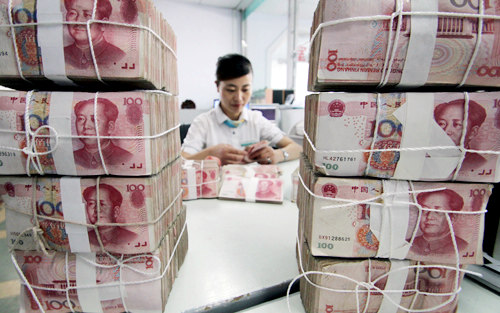|
 |
|
SHRINKING LOAN: A bank worker counts renminbi at the Agriculture Bank of China, Tancheng Branch, in the city of Linyi, east China's Shandong Province, on June 13, 2011. China's newly added loans in May came to 551.6 billion yuan ($87 billion), over 20 percent less than the same period last year (XINHUA) |
China will fine-tune its economic policies in due time and will continue to carry out prudent monetary policy, said the People's Bank of China (PBOC), China's central bank, in its recent third quarterly monetary policy report. The bank didn't say its initial macro-control task is to keep the overall level of prices stable, as it said in its second quarterly monetary policy report, indicating a subtle change in its monetary policy.
As the consumer price index (CPI), a primary indicator of inflation, has declined to 5.5 percent in October year on year, the slowest rise since May, the central bank began to lower yields on one-year bank bills for three successive terms. Newly added loans in October grew by 20 percent since September, easing capital shortage tensions.
The central bank said in its report that it will focus on accelerating transformation of the economic development mode, maintain prudent monetary policy, closely monitor changes in economic and financial situations both at home and abroad, and fine tune the policies when needed. The report mandated price stabilization and minimization of systematic financial risks.
"The central bank began to gradually shift into focusing on transformation of the economic growth mode away from concentrating on inflation control," said the Galaxy Securities in its research report. "That means operation of monetary policy vehicles has entered a phase of prudent balance."
Interest rate cut expected
The decline of inflation has left room for China to seek balance between inflation and economic growth. The central bank's hints to finely tune monetary policy prompted experts to forecast that the central bank may lower the deposits reserve ratios.
"China should relax tightened monetary policy as soon as possible, so as to ensure a soft landing of its economy. While inflation declined, gross domestic product (GDP) is expected to drop significantly due to unclear global economic situation and sluggish real estate market," said Liu Ligang, head of Greater China Economics at ANZ Banking Group. He predicts China would soon lower deposits reserve ratios, and said that the end of November and early December is a crucial time, when the Central Government will convene the annual economic work conference.
Guotai Junan Securities said in its analysis report that the yield of a one-year central bank bill is lower than a one-year fixed deposit, obviously hinting that monetary decision-makers are to decrease deposit reserve ratios before cutting benchmark interest rates. "It is greatly possible for the central bank to lower deposit reserve ratios by the end this year, and cut interest rates after the first three months in 2012," Guotai Junan said.
However, Qu Hongbin, HSBC's chief China economist, argued that it is too early to reduce the deposit reserve ratio. "The time is not mature for the central bank to reverse its policy in a short view, as the current CPI is, after all, is still higher than the 4 percent expected by government officials.
What is more important is that the Central Government does not need to relax overall monetary policy by means of cutting interest rates or decreasing the deposit reserve ratio, as China's GDP continues growing at 8.5 percent to 9 percent, according to the latest statistics.
|
